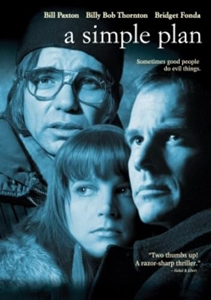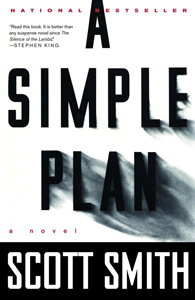“A Simple Plan” (1993) is the consummate novel about cause and effect, choices and consequences, and the differences between inner thoughts and outward appearance. In an efficient and confident debut novel, Scott Smith narrates as Hank, who commits a series of morally questionable acts always with a pragmatic purpose, never out of inborn psychopathy.
It’s only 335 pages long, but it loomed larger in my memory from my first read – from which I remembered stark descriptions such as the way the winter wind from a hole in a truck’s floor shoots up Hank’s pantleg. The novel’s heft comes because the subtext parallels the text throughout, doubling the weight.
The pitch is a “What would you do?” thought experiment. Hank, his estranged older brother Jacob, and Jacob’s drinking buddy Lou find a crashed plane in the woods a half-hour’s drive from their Ohio homes – Hank’s in the suburbs of Toledo, the others’ in a nearby small town. Along with the dead pilot, the interior contains a duffel bag with $4.4 million in cash.

“A Simple Plan” (1993)
Author: Scott Smith
Genre: Suspense
Setting: Late 1980s, Ohio
Note to readers: The Book Club Book Report series features books I’m reading for my book club, Brilliant Bookworms.
The titular plan is simple: Hold onto the money until they learn whether anyone is looking for it; then they can move away and improve their lives with it. Hank – who we sense is a good man because he’s the well-spoken author surrogate — and wife Sarah will go from blandly middle-class to rich. Jacob and Lou will find contentment for the first time.
Jacob is the Lennie to Hank’s George in an “Of Mice and Men” parallel – pathetic yet crushingly sympathetic. While Hank is a stone-cold sober narrator, emotions spill out – and strike the reader – via Jacob. Nothing has gone right for the slovenly but good-hearted Jacob in his 30-plus years, but his goal with the newfound cash is admirable: become a farmer. This contrasts with Lou, who will of course waste it on vices.
Smith’s career takes off
“A Simple Plan” is what the term page-turner was invented to describe. Little things go wrong because, well, you just can’t trust other people, can you? Then solutions must be found – often violent ones. Smith would repeat the “straightforward event grows steadily out of hand” premise in his chilling horror novel, “The Ruins” (2006). I need to do myself a favor and check out his short stories, but I admit it irks me that Smith has only gifted us with two novels.
Especially with the snowy backdrop, “A Simple Plan” is like “Fargo” (a movie that came out three years after this and later became a TV series), except with the comedy excised so the emphasis is on the darkness behind normal people you pass on the street. TV’s “Breaking Bad” and “Better Call Saul” carry on this novel’s tradition of good men turning bad for logical, sensible reasons on an incident-by-incident basis.

Keeping us magnetically attached to the page is an oddity of bad-behaving first-person narrators: We want Hank to get away with everything. When Hank discusses steps along with way with Sarah, it’s an ingenious touch of mundanity: a husband and wife mapping out their life plans.
Smith gives “A Simple Plan” a vibe of fatalism and foreboding, yet when the next thing happens, it’s often shocking in its matter-of-fact-ness. And hanging over everything are the questions of who owns the money, and if they come for it, what will they do?
“A Simple Plan” is a quicker read than I remembered. But thoughts about what I would do if I was in Hank’s shoes linger well beyond the final page.
Novel: 5 stars

THE MOVIE
A deceptively simple transition
Smith wrote his debut novel with jealousy-inducing ease, and he does the same with his first screenplay. The 1998 movie is helped by reliable director Sam Raimi, Danny Elfman’s melancholic score, snowy Minnesota and Wisconsin (replacing the novel’s Ohio) and an A-list cast.
Bill Paxton’s voiceover as Hank initially struck me as disengaged like Harrison Ford’s in “Blade Runner,” but then I realized he is taking a reflective POV like the book character. There’s a difference between saying you’re happy and actually being happy, but it’s not easy for everyone to define happiness amid daily stresses and checklist achievements. The drop from bland contentment to utter devastation is a lot longer than one might think, the movie tells us.
Jacob’s role gets rightly beefed up as Billy Bob Thornton, hot off 1996’s “Sling Blade,” gives another transformative and oddly lovable turn as Jacob, despite the character’s propensity for violence. Thornton, who would later play a man totally in charge of his destiny in “Fargo” Season 1, starkly illustrates the difficulties life presents to unconfident people.

“A Simple Plan” (1998)
Director: Sam Raimi
Writer: Scott B. Smith
Stars: Bill Paxton, Billy Bob Thornton, Bridget Fonda
Bridget Fonda lifts Sarah straight from the page, and Gary Cole is a villain we love to hate as the movie restores something we were arguably robbed of in the book: a final showdown where the Everyman shocks the seasoned villain by matching his depravity.
A more cinematic ‘Plan’
Smith’s key change – keeping Jacob around longer in the narrative – takes advantage of the fact that they have Thornton available and also goes deeper into showing the differences between the brothers. Some people can live with the evil inside them, others can’t. The film becomes a more universal statement.
Interestingly, the film has more shocking cinematic moments – often featuring Jacob’s impulsive decisions — whereas the book is an interior study of Hank’s brain as he mulls and justifies his choices.
The novel is a study of what we’ve lost to the past, with the brothers’ childhood farmhouse already bulldozed and the land sold. The movie is about how the past slides incrementally, tragically out of reach. The film is a tear-jerker whereas the novel is harrowing, but both are simply perfect examples of their form.
Movie: 5 stars

